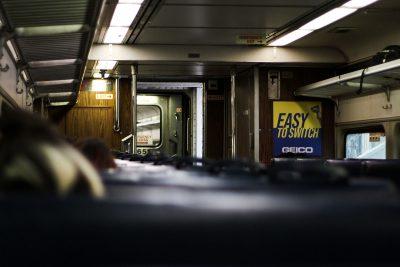The Massachusetts Bay Transportation Authority implemented a series of temporary service changes Saturday, eliminating weekend transit on most commuter rail lines, cutting all weekend ferry transit and modifying weekday schedules for both services.

Weekend commuter rail service will continue only on the Newburyport/Rockport, Framingham/Worcester, Fairmount, Providence and Middleborough lines. Charlestown and Hingham direct ferry service has been suspended temporarily. Ferries along the Hingham/Hull route will run with limited service on weekdays.
The reductions are part of the MBTA’s Forging Ahead initiative, which aims to modify schedules without undermining access to or quality of service, according to a Jan. 19 press release by the organization.
Changes to commuter rail service disproportionately affect lower income riders and essential workers who commute to Boston for work, according to Jarred Johnson, executive director of TransitMatters — a transit advocacy group.
“If you are in some of the gateway cities, which are further out and have a very high percentage of the folks without access to a vehicle … [the commuter rail] provides a really essential link,” he said.
Johnson added the loss of weekend service is uniquely impactful to essential workers, including frontline health care workers, who often work irregular hours and night shifts.
“Essential workers and the jobs and industries that they are in don’t operate on a nine-to-five weekday schedule,” he said. “Last time I checked, hospitals were open seven days a week.”
The reductions, which were approved by the Fiscal Management Control Board in December, come in response to decreased ridership since the onset of the COVID-19 pandemic.
Fall 2020 commuter rail ridership was down roughly 92 percent compared to the previous year, while ferry ridership fell 88 percent, according to the MBTA.
The MBTA and FMCB will continue to evaluate rider needs and the return of services by monitoring changes in ridership, according to the press release.
Johnson said this approach demonstrates a “misunderstanding or a willful ignorance” of the role of public transit — transit service is what creates ridership, he said.
“You don’t bring transit back when there is enough demand,” Johnson said. “People will look for other options if they think the T is going to be too crowded or they look at the schedule and there aren’t trains there.”
Alice Brown, chief of planning and policy at Boston Harbor Now, said the MBTA’s focus on tailoring routes to commuters with regular working hours is misguided.
“What’s being lost in that perception of transit by the current leadership … is the fact that transit is about getting whoever needs to get there from point A to point B,” she said. “It’s about serving the person who, for whatever reason, doesn’t have a car that day but needs to get to that place.”
For residents of Hingham, the ferry is often the most efficient way to get into Boston, according to Brown.
She added the suspended Charlestown ferry — which usually benefits from additional revenue generated by tourism that has declined since March — still services local residents and employees around the Charlestown neighborhood.
She said ridership numbers alone may not reflect the actual need for transportation systems.
“There are people who say, ‘Oh, you know they ran that seven o’clock boat and there were only two people on it,’” Brown said. “Yes, but clearly two people needed to be on that boat at seven o’clock to get somewhere.”
Although the MBTA maintains that the changes to the commuter rail and ferry are temporary, Johnson said he was not confident the train would return to its pre-pandemic service.
“I think these cuts are ideological,” he said, “and I think they have the danger of leading us down a death spiral.”
Brown said the return of ferry service will depend on who is in charge once the pandemic subsides, but she hopes it will present an opportunity to reevaluate how effectively the service is meeting community demands.
“Maybe the schedule shifts a little bit so that it does meet a few more of those riders who need really early morning service,” she said. “How can we rethink and expand and get actually better service at the other end of this hopefully temporary closure?”




























































































































